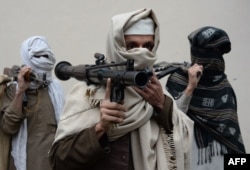A close aide to Afghan President Ashraf Ghani says he is “very positive” that direct peace talks with Taliban insurgents will take place before the end of this month with no conditions from either side. Efforts are under way to determine the venue for the much-anticipated meeting.
In an exclusive interview with VOA, Afghanistan’s newly appointed ambassador to Pakistan, Omar Zakhilwal, singled out for credit Islamabad’s "positive" cooperation for rekindling hopes for Afghan peace.
Unlike his predecessors, Zakhilwal has arrived in Islamabad with the additional responsibility of having “full political authority” and backing of Afghan politicians "across the board" to win Islamabad’s consistent and crucial support for ending the 15-year-old Taliban insurgency in Afghanistan.
A four-nation cooperation group of senior Afghan, Pakistani, American and Chinese officials, at their latest meeting in Islamabad, agreed on a “road map” for peace and announced that direct talks between the warring Afghan sides were expected by the end of February.
“I am very positive that we will,” Zakhilwal said when asked whether the Afghan government and the Taliban will both come to the negotiating table this month.
He went on to say that all the countries involved are currently engaged in intense diplomatic efforts to determine a venue and have established contacts with the Taliban’s political office in Qatar for arranging the peace dialogue.
“We are under no illusion that as soon as we sit with the Taliban, by the end of the day, we will have a settlement out of it. So it's going to be a prolonged process; I hope not so prolonged that people at the end will lose hope in it, but at least it certainly cannot happen in a meeting or two,” Zakhilwal asserted.
Taliban yet to decide
Taliban spokesman Zabihullah Mujahid told VOA that the group’s Qatar office is solely authorized to comment on whether they intend to join the negotiations.
Mujahid denied media reports that said a top Taliban delegation from its Qatar office recently traveled to Pakistan as part of preparations for the upcoming meeting with Afghan peace negotiators.
Ambassador Zakhilwal said predominant public skepticism in Kabul about Pakistan’s assistance in the peace process continues to pose a challenge to President Ghani’s renewed outreach to Islamabad.
Many Afghans have long accused the Pakistani military of giving secret support and sanctuary to the Taliban, enabling the group to sustain its insurgency.
Zakhilwal emphasized the need for all sides to make all possible efforts to overcome “negative perceptions” on both sides, and noted Pakistan’s cooperative approach in the recent four-way talks on the Afghan peace effort.
“There was nothing more that we could have asked for. There was no resistance from Pakistan and there is, so far, full commitment to implement that road map, and I have no doubt that the intentions are not there. But we must keep the environment such that it does not get spoiled, and if we do deliver on this road map I do believe that we will have some early indications that we are on the positive track.”
But, like many Afghan and foreign observers, the ambassador fears a spike in Taliban-led violence in the coming weeks when rising temperatures allow insurgents easier movement through snow-covered high mountain passes.
“When we do not see the violence diminishing in the process, then the public will not believe in the process they will say ‘look the Taliban are using this just as a delaying tactic or playing [a game with us]’. So, that’s why what we have in the roadmap as an indicator of the success of the negotiation in this process and as an indicator to the public that they should be supporting it, diminishing violence.”
Islamabad's influence
Pakistani officials insist they have “limited” influence with the Taliban to try to persuade them to engage in talks, and dismiss suggestions they completely control them or can influence their battlefield activities inside Afghanistan.
Zakhilwal dismisses widespread criticism that there are disagreements between President Ghani and Chief Executive Abdullah Abdullah over engaging the Taliban in peace talks.
Without going into details, the Afghan ambassador said the national unity government is ready for “give and take” and to accommodate the Taliban in the political and power structure when negotiations begin. He reiterated neither side should insist on pre-conditions.
Zakhilwal also criticized the latest U.S. intelligence assessments that Afghanistan is “at risk of political breakdown” during 2016 because of political disagreements, economic deterioration and worsening national security.
“They have been proven wrong before and they will be proven wrong again… there is enough maturity within the politicians of Afghanistan to understand the risks of following any other path other than the path of positive engagements and supporting and being behind the government at a time when the time is extremely challenging.”






